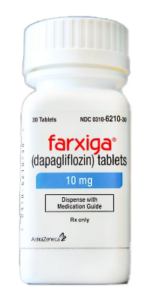
Dapagliflozin-Farxiga – SGLT-2 inhibitor
Dapagliflozin is a pharmaceutical agent indicated for the management of type 2 diabetes, heart failure, and chronic kidney disease (CKD). It belongs to the class of sodium-glucose cotransporter-2 (SGLT-2) inhibitors, which have proven effective in lowering blood glucose levels and offering additional cardiovascular and renal benefits.
Mechanism of Action of Dapagliflozin
Dapagliflozin works by inhibiting the SGLT-2 transporter in the kidneys. This transporter normally reabsorbs glucose from urine back into the bloodstream. By blocking SGLT-2, dapagliflozin increases glucose excretion through urine, thereby lowering blood sugar levels.
Additionally, it promotes the excretion of sodium and water, resulting in diuretic effects. This helps reduce fluid retention and lower blood pressure, making it beneficial for patients with heart failure or kidney disease.
Drug Class
- Class: SGLT-2 Inhibitor
- Mechanism: Blocks glucose reabsorption in the kidneys
- Other Drugs in Class: Empagliflozin, Canagliflozin, Ertugliflozin
Uses of Dapagliflozin
1. Type 2 Diabetes
Dapagliflozin is used to manage blood glucose levels in patients with type 2 diabetes, often in combination with other diabetes medications.
2. Heart Failure
It contributes to lowering the likelihood of hospitalization resulting from heart failure and decreases the risk of cardiovascular mortality in individuals diagnosed with heart failure with reduced ejection fraction (HFrEF).
3. Chronic Kidney Disease (CKD)
Dapagliflozin slows the progression of kidney disease, especially in those with albuminuria (protein in the urine).
Side Effects of Dapagliflozin
• Common Side Effects
- Urinary tract infections (UTIs)
- Genital fungal infections (more common in women)
- Increased urination
- Thirst and dehydration
- Dizziness upon standing
• Serious Side Effects
- Diabetic ketoacidosis (DKA)
- Acute kidney injury
- Low blood pressure (hypotension)
- Electrolyte imbalances (low sodium or potassium)
- Bone fractures (with long-term use)
Contraindications of Dapagliflozin
It should not be used in the following cases:
• Severe Renal Impairment
Dapagliflozin is contraindicated in patients with severe kidney dysfunction (eGFR < 30 mL/min/1.73 m²).
• Hypersensitivity
Patients with known allergies to dapagliflozin or its components should avoid its use.
• Diabetic Ketoacidosis (DKA)
Dapagliflozin increases the risk of DKA, so it should be avoided in patients with a history of this condition.
Drug Interactions of Dapagliflozin
It may interact with several drugs:
1. Diuretics
Can increase the risk of dehydration and hypotension.
2. Insulin or Insulin Secretagogues
May lead to an increased risk of hypoglycemia when combined with insulin or sulfonylureas.
3. ACE Inhibitors and ARBs
These medications can increase the risk of kidney injury or low blood pressure when taken with dapagliflozin.
4. Lithium
Dapagliflozin can increase the renal clearance of lithium, reducing its effectiveness.
Brand Names and Specifications
Brand Name : Farxiga
Active Ingredient :Dapagliflozin
Strength :5 mg, 10 mg
Indication :Type 2 Diabetes, Heart Failure, CKD
Manufacturer :AstraZeneca
Conclusion
Dapagliflozin is an effective treatment for type 2 diabetes, heart failure, and chronic kidney disease. Its dual mechanism of action—lowering blood sugar and promoting fluid excretion—provides significant cardiovascular and renal benefits. While generally well tolerated, it may cause side effects such as urinary tract infections and dehydration. It is essential to consider contraindications and potential drug interactions to ensure its safe use. Prior to commencing any treatment, it is advisable to consult with a healthcare provider.
